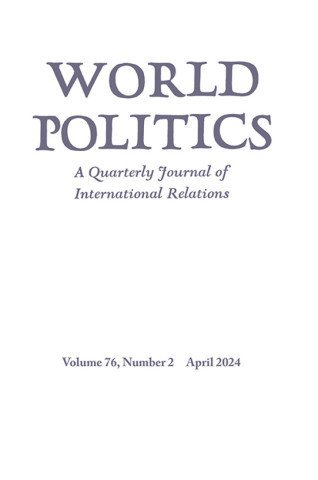International Dimensions of Democratization
IF 4.5
1区 社会学
Q1 INTERNATIONAL RELATIONS
引用次数: 0
Abstract
Since the 1970s, international influences on democratization have received increasing attention from scholars and policymakers. Scholars pointed to multiple mechanisms by which international factors could influence the transition to and the consolidation of democracy. While the arguments mostly pointed to positive influences, the optimism of the post–Cold War era have given way to concern about international sources of authoritarianism and democratic backsliding. The authors provide a framework for thinking about what we know about international forces and democratization, outlining several unanswered questions. Several research challenges remain, including how to best assess mechanisms linking international processes and actors to democracy (and democratization); while others concern threats to those democratic transitions via democratic backsliding. The article concludes by calling for more integration of existing theoretical frameworks on international factors and democracy with the current wave of research on authoritarianism and democratic backsliding.民主化的国际层面
自 20 世纪 70 年代以来,国际社会对民主化的影响日益受到学者和政策制定者的关注。学者们指出了国际因素可能影响民主过渡和民主巩固的多种机制。虽然这些论点大多指向积极的影响,但冷战后时代的乐观主义已让位于对专制主义和民主倒退的国际根源的担忧。作者提供了一个框架来思考我们对国际力量和民主化的认识,并概述了几个未解之谜。一些研究挑战依然存在,包括如何最好地评估将国际进程和行为者与民主(和民主化)联系起来的机制;另一些挑战则涉及民主倒退对民主过渡的威胁。文章最后呼吁将现有的国际因素与民主的理论框架与当前关于威权主义和民主倒退的研究浪潮进行更多整合。
本文章由计算机程序翻译,如有差异,请以英文原文为准。
求助全文
约1分钟内获得全文
求助全文
来源期刊

World Politics
Multiple-
CiteScore
8.40
自引率
0.00%
发文量
24
期刊介绍:
World Politics, founded in 1948, is an internationally renowned quarterly journal of political science published in both print and online versions. Open to contributions by scholars, World Politics invites submission of research articles that make theoretical and empirical contributions to the literature, review articles, and research notes bearing on problems in international relations and comparative politics. The journal does not publish articles on current affairs, policy pieces, or narratives of a journalistic nature. Articles submitted for consideration are unsolicited, except for review articles, which are usually commissioned. Published for the Princeton Institute for International and Regional Affairs
 求助内容:
求助内容: 应助结果提醒方式:
应助结果提醒方式:


